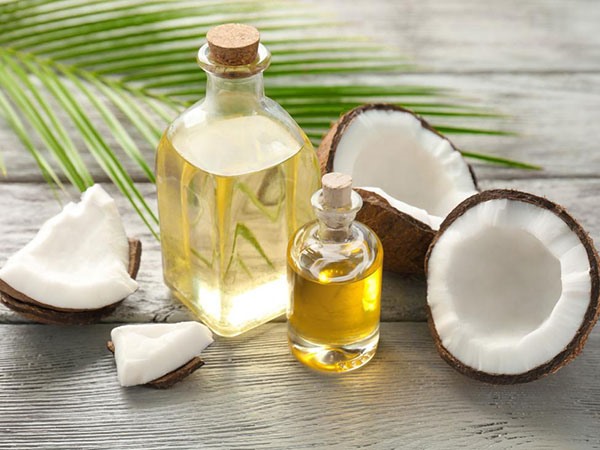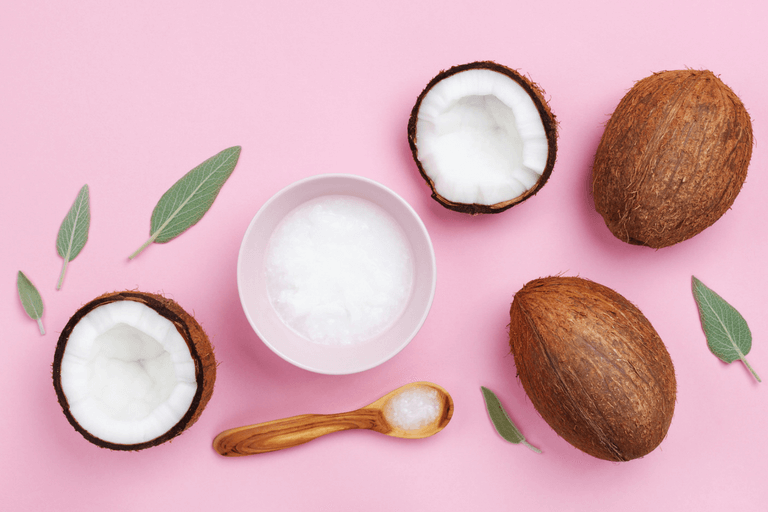Ingredients in coconut oil
The ingredients of coconut oil are about 90% saturated neutral fat. In which lauric acid is 49% in coconut oil, has antibacterial and antifungal properties. Other saturated fatty acids like myristic acid (18%) can moisturize the skin, capric acid (7%) helps nourish the skin, linoleic acid (2%) acts as a cleanser…
With these ingredients, coconut oil has been proven to have many benefits in achieving healthier and smoother skin.

Main uses of coconut oil for the skin
Moisturize the skin and lock in moisture
Coconut oil contains 80 – 90% saturated fats. Therefore, when applied to the skin, this type of oil acts as an emollient, helping to moisturize and create a protective barrier for the skin.
Reduce skin inflammation
Coconut oil has anti-inflammatory properties, helping to reduce skin irritation. That’s why it is often used to heal inflamed skin. This type of oil is considered 100% natural and safe to use for skin conditions like eczema.
Antibacterial
The rich content of fatty acids in coconut oil helps to inhibit the growth of some microorganisms on the skin.
The antibacterial properties of coconut oil help fight against bacteria that cause acne. Some studies have shown that lauric acid has a stronger ability to destroy propionibacterium acnes bacteria that cause acne than benzoyl peroxide (a common acne treatment).
Enhance collagen production
Coconut oil is rich in vitamins A and E, which help protect the skin from free radicals. These are agents that can break down the collagen layer of the skin, leading to aging.

Is coconut oil good for the face?
Although coconut oil provides important benefits of moisturizing and anti-inflammatory effects, not everyone can benefit from its use. Specifically, coconut oil is only suitable for people with dry and regularly peeling skin due to lack of water.
This oil is not recommended for oily or acne-prone skin. Its thick and creamy texture can easily clog pores, leading to acne breakouts.
Side effects of coconut oil on the face
Causing acne breakouts
Coconut oil can clog pores, causing blackheads, whiteheads, pimples, and irritations. Applying coconut oil, especially leaving it overnight on the face, can make the acne condition worse.
Allergic reactions
Although rare, allergic reactions to coconut oil can occur. Symptoms of coconut oil allergy include itching, redness, rashes, or hives… Therefore, people with sensitive skin should be cautious of the side effects of coconut oil on the face.
Causing fungal infections on the skin
When heavily clogging pores, coconut oil can cause the facial skin to become infected with fungi. One of the fungal conditions that coconut oil can cause is pityrosporum folliculitis.
Darkening the skin
Coconut oil, olive oil, lemongrass oil… do not have sun protection and UV protection abilities. Therefore, with this misconception, many people have used coconut oil instead of sunscreen. The consequence is that it makes the skin more sunburned.
If this is your first time using coconut oil on your face, check it first with other areas of your skin to see if an allergic reaction may occur. Only use a small amount of coconut oil to test the skin. Perform the test with the wrist and wait for 24 hours to see the result. Especially, do not use coconut oil on thin skin areas such as around the eyes to avoid the side effects of coconut oil on the face causing the skin to become lumpy.




































